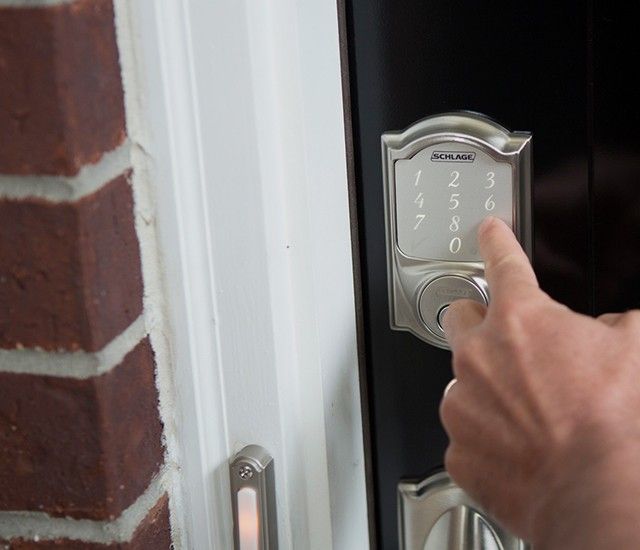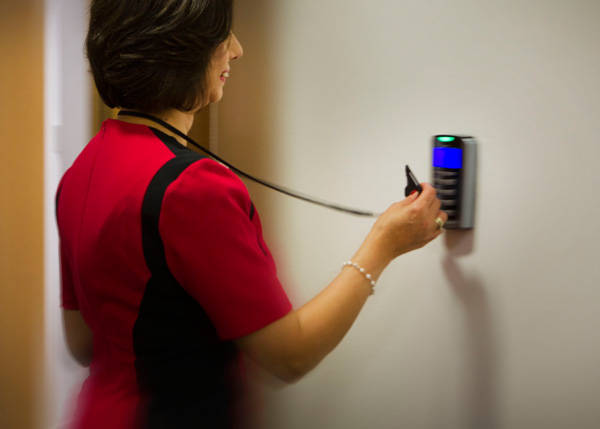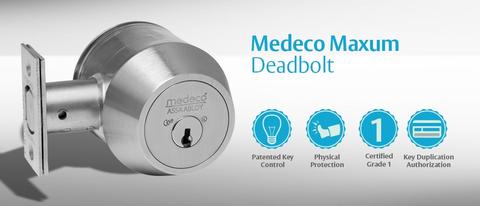We often call door hardware the “first line of defense” against burglars. This is because thieves often prefer to breach doors over other means of entrance. After all, burglars who can pick a lock quickly look much less suspicious than they would crawling through a window. Additionally, many property owners install extremely cheap lock hardware on their doors. Of course, this can make doors a surprisingly easy target for thieves. However, as your one-stop security shop, we have plenty of experience increasing security in this important area. In this post, we share some tips for securing your most important doors.
We will begin with a couple options for residential door security. These include adding keypad locks, which can increase key security. Additionally, we will discuss a unique lock option that burglars cannot even detect from the outside! From there, we will look at a couple commercial lock options. These options will start with a demonstration of how master key systems can help you control access to your business. Additionally, we’ll examine the role electronic access control in controlling and tracking access to your property. Finally, we’ll look at how high-security deadbolts can increase door security in both homes and businesses alike! Now, let’s get started by looking into residential options for securing your most important doors.
Residential Door Options
Residential door security has a few factors going against it from the start. For one, residential lock manufacturers often value price point more than security when creating their products. Of course, you generally get what you pay for when you purchase security. In this case, that means you won’t get much. We’ll address this issue later on. In this section, we’ll begin our discussion with an option to end key-control issues. Key security often hits residential customers much more than their commercial counterparts. Then, we will examine a hardware option that addresses doors with large windows on them. Since many homes have these types of doors, we’ll look at a unique option to address this security concern. Let’s begin by examining the extra security provided by adding a keypad lock!

A smart keypad deadbolt, such as this lock by Schlage, allows for both key-based entry and remote operation through a smart phone.
Keypad Locks
As we mentioned, many homeowners struggle to track who they’ve given keys to, and when. Homeowners with kids often give keys to neighbors in case of lock-outs. Additionally, families who travel frequently often have to pass out keys to pet sitters and house sitters. Finally, many families “hide” spare keys around the house in hiding places that might not prove as clever as they had hoped. Add it all up, and you may end up with a situation where the wrong individual eventually winds up with a key!
To combat this issue, we recommend installing keypad locks. These locks allow you to provide a code, rather than a key, to grant access to your home. Furthermore, smart keypad locks, such as the one pictured, even allow you to lock and unlock your door remotely! Therefore, installing them allows you to provide contractors or neighbors one-time access to your home without providing a key or a code! This unique level of security makes these locks a popular addition for many of our customers.
Turn Bolts
As we mentioned, many residential doors have large windows on them. This allows burglars to break the window and unlock the doors from the outside. In cases where homeowners install double-sided deadbolts, seasoned criminals can still use a variety of lock picking hardware to break through these locks. Installing a turn bolt adds a lock that criminals cannot locate from outside your door. A turn bolt is a bolt that locks and unlocks from the inside only, without any hardware showing on the outside of your door. Therefore, not only can criminals not see these locks, but they cannot pick them either! At this point, we’ve seen a couple unique home lock options. Now, let’s turn our attention to some great commercial options for securing your most important doors.
Commercial Options
Commercial door security brings about its own unique set of security concerns. Unlike residential doors and locks, commercial door and lock manufacturers generally create their products with security in mind. While some businesses still fail to have the “best of the best” lock hardware, the worst commercial locks still generally create better security than lower-grade residential locks. However, businesses still deserve extra attention when it comes to door security. Specifically, commercial customers must decide who they want to let into which parts of their building, and when. In this section, we’ll discuss a couple ways we can address this concern. We’ll begin with a popular mechanical method that involves creating a master key system. From there, we’ll discuss how electronic access control can help secure access to your business.
Master Key Systems
Master key systems allow customers to create different “levels” of access to their property. As you can probably guess by the name, the “master key” offers the greatest level of access. This key works all of the doors on the master key system. From there, users have tremendous freedom in creating keys that open different combinations of doors. For example, many employees receive keys that open a business’s exterior doors, common doors, and their own offices. These key still keeps each employee out of other offices. Additionally, it keeps them out of parts of the building requiring more restricted access.

Access card readers, such as this one made by AMAG, help business owners control and track access to their property’s most important doors.
Furthermore, master key customers can also create additional keys for different applications. For example, delivery drivers may receive a key that only operates one door of the entire property. Cleaning companies may receive a key that lets them open any door except those for rooms that house valuables and electronics. This type of flexibility and door security make master key systems one of our highest-recommended forms of door and key security. Now, let’s look at another way that business owners control access to certain areas of their property!
Access Control
Access control systems represent an increasingly popular business security option. This security measure involves using advanced lock equipment to control access to your property. Access control systems utilize electronic locking hardware to operate specific doors within a business. Rather than using a key at these doors, users approach a reader and present a credential. Occasionally, these credentials take biometric forms. We can install readers that use fingerprint, palm, or even eye scans as a credential. However, more often than not we provide cards or fobs as a credential to hold in front of a reader. Users who present an approved credential will then be able to open the door after the reader interacts with the door’s electronics to unlock it. Business owners can assign each credential to open only certain doors at specific times, giving them tremendous control over who can open which doors, and when.
In addition to controlling access to certain doors, access control systems include software that tracks access as well! Every time an employee uses their credentials, it creates a time-stamped event that you can view on a computer by logging in to your access control system. This allows you to easily track employee activity within your business. Furthermore, it allows you to see if anyone tries to enter doors in your business that they should not attempt to enter. For example, if an employee without the necessary credentials attempts to enter a secure room, the system will both deny access and “flag” this event. At that point, you will know which employee attempted this breach. The security and flexibility offered by these systems makes them an increasingly popular commercial door security option!
High-Quality Deadbolts
Both residential and commercial locks vary greatly in both price point and quality. In fact, lock hardware quality varies so much that the industry uses a three-point grading system designed by the American National Standards Institute (ANSI) and Builders Hardware Manufacturers Association (BHMA) to “grade” a lock’s effectiveness! Lock manufacturers often seek out ANSI/BHMA certification for their product lines. Standardized tests gauge factors such as bolt strength, security, ability to withstand impact and force, and quality of finish, among others. Allegion, one of the biggest global providers of security products, provides this helpful guide to door hardware testing. The lowest-quality hardware receives a “Grade 3” designation, with the best scoring in at Grade 1. As you can probably guess, Grade 2 falls right in the middle. Grade 2 locks represent a step up from Grade 3, without having quite the quality of a Grade 1 lock.

High-quality deadbolts, such as this model by Medeco, can withstand much greater abuse than lower-grade locks that burglars breach on a regular basis.
Unfortunately, most residential locks found in hardware stores for bargain prices fall under Grade 3 quality standards. Burglars can easily pick these locks, or drill them to gain access to your property. Commercial locks generally fall under the standards set for Grade 1 or Grade 2 locks. We recommend installing Grade 1 locks, such as our preferred locks by Medeco, on your property. Whether purchasing locks for a home or a business, ask about a lock’s grade before making a decision to ensure you get what you need to secure your most important doors.
Putting it All Together and Securing Your Most Important Doors
We hope that this post has helped explain some creative options for securing your most important doors. Despite the importance of door security, many residential and commercial customers alike often fall short in this department. Therefore, we encourage you to contact us if you think we can help in any way. Moreover, we encourage you to take advantage of our free site survey program. We offer free surveys and estimates to both new and existing customers alike. Perhaps you have a new property and want to build a door security plan from the ground up. Or, maybe you have existing locks in place and wish to design a security upgrade. Either way, we are here to help. Together, we can create a plan to secure your doors and keep your property — and those inside of it — as safe and secure as possible!
